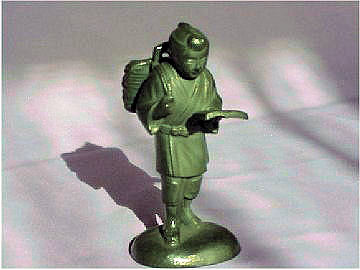|
[52 Ninomiya Sontoku] The source:「REPRESENTATIVE MEN OF JAPAN」
〔Boyhood〕 Ninomiya Kinjirou, surnamed Sontoku (Admirer of Virtue), was born in the seventh year of Tenmei (1787). His father was a farmer of very small means in an obscure village in the province of Sagami, notable, however, among his neighbors for his charity and public spirit. At the age of 16, Sontoku, with his two little brothers, was orphaned, and the conference of his relatives decided upon the dissolution of his poor family, and he, the eldest, was placed under the custody of one of his paternal uncles. Here the lad's whole endeavor was to be as little burdensome to his uncle as possible. He lamented that he could not do to a man's part, and to make up what he in his youth could not accomplish in daytime, he would work till very late at midnight. Then came a thought to him that he would not grow up to be an illiterate man, a person with "open, seeing eyes, yet blind" to the wisdoms of the ancients. So he procured a copy of Confucius' Great Learing, and in the depth of night after the day's full work, he applied himself assiduously to his classical study. But soon his uncle found him at his study, sharply reprimanded him for the use of precious oil for work from which he (the uncle) could not derive any benefit, and could see no practical good to the youth himself. Sontoku considered his uncle's resentment reasonable, and gave up his study till he could have oil of his own to burn. So the nex spring, he broke up a little land that belonged to nobody, on the bank of a river, and there planted some rape-seed and gave all of his holidays to the raising of this crop of his own. At the end of one year, he had a large bagful of the seed, the product of his own hand, and received directly from Nature as a reward of his honest labor. He took the seed to a neighboring oil-factory, had it exchanged for a few gallons of the oil, and was glad beyond expression that he could now resume his study without drawing from his uncle's store. Triumphantly he returned to his night-lesson, not without some hope of words of applause from his uncle for patience and industry such as his. But no! the uncle said that the youth's time was also his, seeing that he supported him, and that he could not afford to let any of his engage in so unprofitable a work as book-reading. Sontoku again thinks his uncle is reasonable, follows his behest, and goes to mat-weaving and sandal-making after the day's heavy work upon the farm is done. Since then, his studies were prosecuted on his way to and from hills whereunto he was daily sent to fetch hay and fuel for his uncle's household. His holidays were his, and he was not one to throw them away for amusements. His experiment with the rape-seed taught him the value of earnest labor, and he wished to renew his experiment upon a larger scale. He found in his village a spot changed into a marsh-pond by a recent flood, wherein was a capital opportunity for him to employ his holidays for useful purposes. He drained the pond, levelled its bottom, and prepared it for a snug little ricefield. There he planted some seedlings that he picked out of the surplus usually cast away by farmers, and bestowed upon them a summer's watchful care. The autumn brought him a bagful (2 bushels) of golden grain, and we can imagine the joy of our orphan-boy who for the first time in his life had his life-stuff provided him as a reward for his humble effort. The crop he gathered that autumn was the fund upon which he started his eventful career. True, independent man was he! He learnt that Nature is faithful to honest sons of toil, and all his subsequent reforms were based upon this simple principle that Nature rewardeth abundantly them that obey her laws. A few years afterward he left his uncle's house, and with what little grain he gathered wuth his own hand out of his the mere refuse lands he discovered and improved in his village, he returned to his paternal cottage now deserted for many years. With his patience, faith, and industry, nothing stood in his way on his attempt to convert chaos and desolation into order and productivity. Declivities of hills, waste spots on river-banks, roadsides, marshes, all added wealth and substance to him, and before many years he was a man of no little means, respected by his entire neighborhood for his exemplary economy and industry. He conquered all things for himself, and he was ready to help others to make similar conquests for themselves. |
| ■ next |
